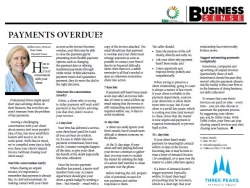Debbie Jones - Payments Overdue?2019-03-04 How to have THAT conversation with your client.
Professional firms might spend their days advising clients on their finances, but even they are aren't immune from the problem of late payments. Having a challenging conversation with your client about money isn't most people's idea of fun, but most small firm leaders will need to do it at some point. With that in mind, we've compiled some tips to help you chase your client's unpaid invoice (without chasing your client away). Start the conversation (early) When chasing an unpaid invoice, it's important to remember that payment is already late. So, don't procrastinate. By making contact with your client as soon as the invoice becomes overdue, your firm may be able to close the payment gap by presenting more flexible payment options, such as changing the payment date or offering instalment payments through Debit Order. Whilst alternative payment routes don't guarantee payment, they do move the dial in the right direction. Structure the conversation (clearly) Often, a client who is trying to delay payment will wait until payment is due before advising you that they didn't receive your invoice. 1-3 days late Your firm has delivered a service, your client hasn't paid for it and all you can hear are crickets. So, it's easy to think that nonpayment is intentional, but it may not be. Genuine oversights happen all the time, so give your client the benefit of the doubt (especially first-time offenders). Once the invoice payment deadline has passed, a junior staff member from your Accounts department should give your client a gentle nudge by sending a firm - but friendly - email with a copy of the invoice attached. The email should say that payment is overdue and your client must arrange payment as soon as possible or contact your firm if they're in financial difficulty. More often than not, a subtle reminder is all that's needed to spur an otherwise motionless client into action. 7 days late If payment still hasn't been made seven days after an invoice falls due, it's time to send a follow-up email stating that the invoice is still outstanding and payment is required within, say, 14 days to avoid escalation. 21 days late A client can easily ignore your firm's emails, but it's much more difficult to dismiss someone on the phone. At the 21-day stage, if your client still isn't playing ball and your invoice continues to gather dust, you may want to escalate the matter by enlisting the help of a senior staff member to chase payment over the phone. Before making the call, prepare a list of potential excuses for non-payment and outline responses to them. The caller should:
30+ days late If your client hasn't made payment (or meaningful contact) within 30 days of the invoice becoming due, it may be time to issue a letter of demand (Section 129 compliant), or to pass over the matter to a debt collection agency. If a letter of demand doesn't trigger payment (typically, within 30 days) then legal proceedings may be necessary, which is a clear sign that your relationship has irretrievably broken down. Suggest automating payments (completely) Sometimes, companies end up writing off unpaid invoices (particularly those of wellintentioned clients) because they weren't effective payment-chasers. But the reality is that your firm is in the business of doing business, not debt collection! To ensure that your firm's invoices are paid on time - every time - you can also choose to automate the payment process by suggesting your clients pay you by Debit Order. With Debit Order, your firm can stop chasing unpaid invoices and start chasing new business. Contact Details T: 0861 373 257 E: info@threepeaks.co.za / A: Offices in JHB, CT & DBN View article Payments Overdue? - http://www.kznchamber.co.za/News/index.php/;focus=HETZA_cm4all_com_widgets_News_757729&path=?m=d&a=20190304114536-4706&cp=1#HETZA_cm4all_com_widgets_News_757729 |
Debbie Jones - Payments Overdue?
Copyright © 2026 KwaZulu-Natal Top Business
